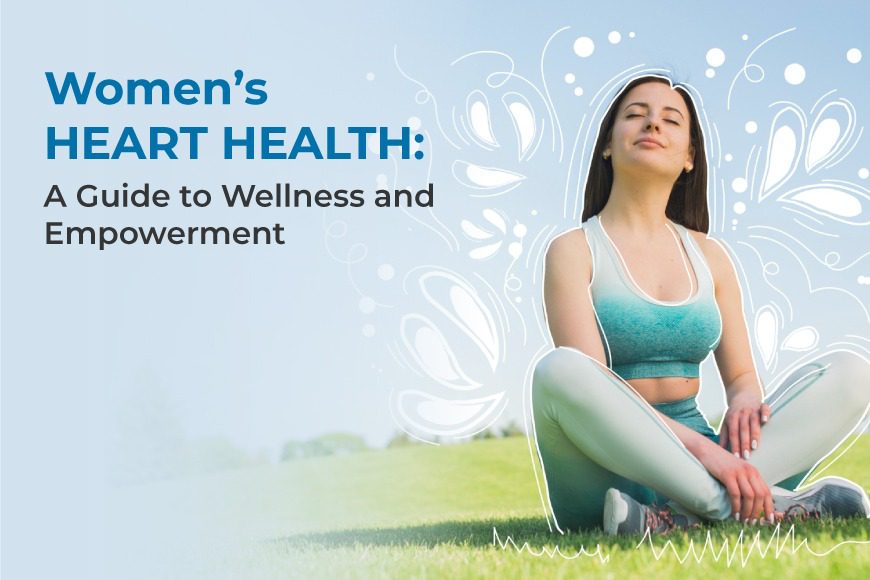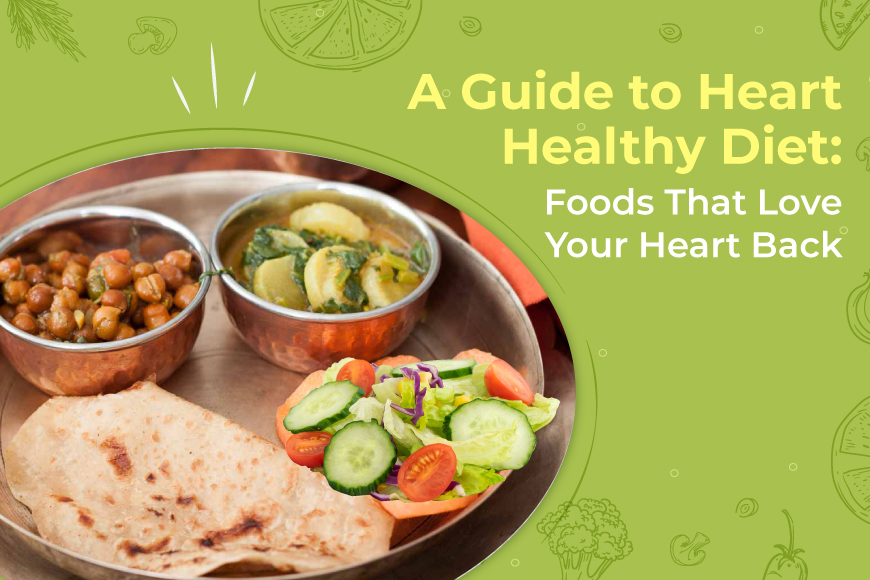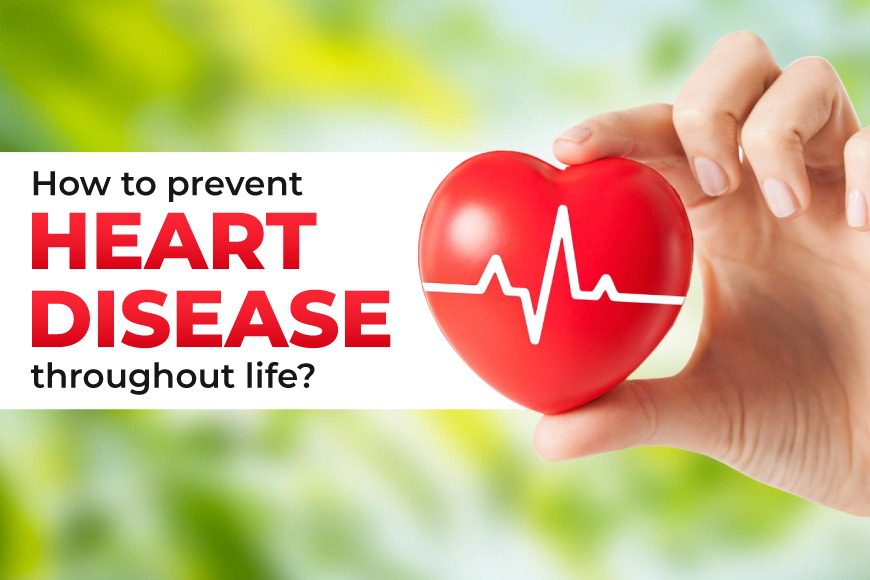Know Your Heart
Learn about the basics of the heart, its functioning, causes of heart blockages, heart attacks, heart condition symptoms and more.

What is Heart?


The heart is a fist-sized organ that pumps blood throughout your body. It is located in the chest wall between the lungs, a little to the left of the sternum (breastbone). It functions as the central component of your circulatory system. The parts of your heart are like the sections of a house. Your heart has:
- Walls
- Valves (doors)
- Chambers (rooms)
- Blood vessels (plumbing)
- Electrical conduction system (electricity)
How does the Heart Work?
To regulate your heart rate and other bodily processes, the heart collaborates with other body systems. These are the main systems:
- Your nervous system plays a role in regulating your heart rate. It delivers signals to your heart telling it to beat more quickly under stress and less quickly when you’re at rest.
- Hormones are released by your body’s endocrine system. These hormones instruct your blood vessels to tighten or loosen, which has an impact on your blood pressure. Additionally, thyroid hormones can instruct your heart to beat more quickly or more slowly.
- That’s how the heart’s coordinated contractions, driven by electrical impulses, maintain circulation critical for bodily functions
Let us understand the workings of the heart step by step:
Step 1 – Blood with low oxygen levels is pumped by the right ventricle to the lungs, where it picks up new oxygen.
Step 2 – Blood with a high oxygen content is brought from the lungs by the left atrium and pumped to the left ventricle.
Step 3 – Blood with a high oxygen content is pumped throughout the body via the left ventricle.
Thus, a rhythmically contracting heart continuously pumps oxygen-rich blood from the lungs into the arteries, delivering nutrients and oxygen to cells. This systemic circulation supplies oxygen and nutrients to tissues and organs.
What is the function of the Heart?
The heart, which serves as the hub of the circulatory system, is in charge of pumping blood, giving oxygen and nutrients to all organs and muscles, and expelling metabolic waste products like carbon dioxide from all of the body’s tissues. The cardiovascular system is made up of the heart and an intricate web of arteries and veins.
Did you know that your heart beats roughly 80 times per minute and about 115,000 times every day? This means heart continuously circulates roughly 5 litres (1.3 gallons) of blood (via your circulatory system, a network of blood vessels) in just 1 minute throughout your body. If we calculate it for a day – The heart pumps approximately 7500 Litres (2000 Gallons) per Day of blood to our body.
In the nutshell:
The human heart performs the following functions:
- Pumping blood with oxygen to other body regions
- Delivering hormones and other necessary materials to various bodily areas
- Receiving oxygen-poor blood, pumping it to the lungs for oxygenation, and carrying bodily waste to be expelled
- Keeping blood pressure constant
What is a Heart Disease?
Heart disease is another name for cardiac disease. Cardiac disease is a broad word that refers to a variety of cardiac issues. Heart and blood vessel disease is another name for it.
Some of the different/common types of heart diseases are mentioned below:
- Artery disease: It is a condition affecting the blood arteries supplying the heart muscle, also known as coronary heart disease or coronary artery disease.
- Cerebrovascular disease: It is a condition affecting the blood arteries supplying the brain.
- Peripheral arterial disease: A condition of the blood arteries supplying the arms and legs known as peripheral arterial disease.
- Rheumatic heart disease: It is caused by streptococcal bacteria, which also cause rheumatic fever, which damages the heart muscle and heart valves.
- Deep vein thrombosis and pulmonary embolism: These are blood clots that can migrate from the leg veins to the heart and lungs when they dislodge.
- Congestive heart failure: It is a loss in the heart's capacity to pump blood as a result of an accumulation of extra fluid.
- Arrhythmia: It is an abnormal heartbeat brought on by poor electrical signals.


What is Coronary Heart Disease or Coronary Artery Disease/CAD?
Coronary heart disease, also known as coronary artery disease (CAD), is a condition marked by swelling and the accumulation of fatty deposits along the coronary arteries’ innermost layer. The fatty deposits may start to form in infancy and continue to thicken and increase as people age. The narrowing of the arteries caused by this thickening, known as atherosclerosis, can reduce or obstruct the flow of blood to the heart.
According to the Indian Heart Health Association, men under the age of 50 account for 50% of all heart attacks in India, while men under the age of 40 account for 25%. Men are slightly more prone to cardiovascular problems than women are.
What are the risk factors for blockages in Coronary Arteries?
Risk factors are elements that make you more likely to get the disease.
There are numerous risk factors for coronary artery blockages. For ease of comprehension, we have divided risk factors into 2 main categories.
1. Non-Modifiable – In other words, they cannot be altered and are non-modifiable.
2. Modifiable – You can take action to alter something that is malleable.
What is Heart Attack?
Myocardial infarction, often known as a heart attack or coronary thrombosis in medicine, is the result of a complete blockage of the blood flow to a portion of the heart muscles. This happens when either of the coronary arteries or any of their branches are completely blocked. Death results from the complete deprivation of the cardiac muscles’ blood and oxygen supply.
Depending on how much of the heart muscle is actually affected, the severity and symptoms of the heart failure will vary. If only 5 to 10% of the affected area is affected, it is considered moderate and most individuals recover. However, a serious heart attack is one in which more than 30 to 40 percent of the heart muscles are dead. Serious heart attacks can even be fatal if they are not treated appropriately and promptly.
Have a question? Reach our heart experts!
Get answers to all your queries and start your journey to healthy heartbeats
Patients Speaks


My blockage was 80-90% and heart pumping was about 24 and my main complaints were discomfort, unable to walk, major breathing issues. That is when I came across SAAOL and Dr. Bimal Chhajer. I watched his lectures and learned that Heart blockages can be reversed without surgery and with a few lifestyle changes. I started my treatment at SAAOL and within a month’s time I feel much healthier and are able to perform all day-to-day activities with ease. I am able to walk for an hour daily, I don’t feel fatigue or any kind of discomfort now. I am very grateful to Dr. Chhajer for his guidance and for providing heart patients with an alternate that is cost effective also.


I had a minor heart attack in 1989 and doctors told me that getting bypass surgery is my only option but I refused. I met Dr. Bimal Chhajer at a medical residential camp in Faridabad and at that time I was unable to do day-to-day work due to excessive pain in my body and I was taking atleast 6-7 Sorbitrate tablets per day. I immediately started the EECP treatment and Detox Therapy along with diet and lifestyle changes including yoga, and meditation, and followed a zero oil diet plan for 40 days. For 2 years I kept on following these lifestyle changes and now after 25 years I am completely fine and I am also able to do normal day-to-day activities very easily. All this was made possible SAAOL without any kind of bypass surgery or angioplasty.


Year ago my husband was suffering from angina and discomfort in walking and doing sedentary activities. We heard about SAAOL through YouTube. We consulted Dr.Chhajer and were told that my husband’s Heart health could get better without surgery and with a few lifestyle changes. Post completion of the treatment his test reports only showed 50% blockage. He takes his regular medication and follows the SAAOL recommended Lifestyle like Zero Oil Cooking, Yoga, etc. His health is constantly improving. We are very grateful to SAAOL and Dr.Chhajer for his noble service for the society.


About 6-7 months ago I suffered from minor angina due to which doctors told me to go for a stent. After 3 months, I had a Heart stroke which got me really worried about my health. A friend recommended Dr.Bimal’s YouTube channel and I got to know about Natural Bypass. . It is a process that treats Heart blockage without any surgery and I started my treatment immediately. I took 35 EECP sessions along with medication and followed the SAAOL Lifestyle. I am so relieved now as my condition has improved tremendously and I am at ease now. I would like to thank Dr.Chhajer for his advise and for healing lakhs of Heart patients the Natural way. I will definitely spread knowledge about this treatment to my near and dear ones.
Patient Education
Explore a wide range of health-related topics and learn more about keeping your heart robust and healthy.
Reverse Your Heart Blockages with EECP Treatment
Nurturing Women’s Heart Health: Your Handbook for Knowledge, Protection, and Self-Empowerment
New CSI Guidelines: The Significance of Early Lipid Profiling and Non-Fasting Tests
Nurturing Women’s Heart Health: Your Handbook for Knowledge, Protection, and Self-Empowerment
New CSI Guidelines: The Significance of Early Lipid Profiling and Non-Fasting Tests
A Guide to Heart-Healthy Diet: Foods That Love Your Heart Back
- 1
- 2
No post found
Reverse Your Heart Blockages with EECP Treatment
How to prevent heart disease throughout life?
How to monitor heart health at home?
- 1
- 2






